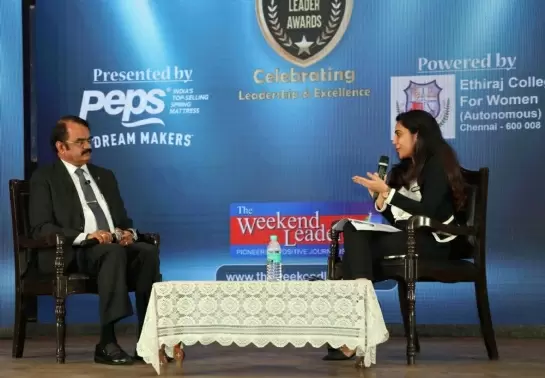Opposition impeachment motion against CJI rejected
23-April-2018
In a setback to the opposition, the impeachment motion against Chief Justice Dipak Misra was on Monday rejected by Rajya Sabha Chairman M. Venkaiah Naidu on the ground that there was lack of "credible and verifiable" information on charges of "misbehaviour" which undermined judiciary's independence.
"... we cannot allow any of our pillars of governance to be weakened by any thought, word or action," he said in a 10-page order, holding that admission of the notice was "neither desirable nor proper".
"I am also aware that it is imperative that we should have extraordinary, important and substantial grounds for the removal of a judge," he said in the order after holding legal consultations on Sunday.
The Chairman's ruling came before proceedings opened in the Supreme Court on Monday apparently to enable the Chief Justice to continue his work uninterrupted.
On April 20, 64 members of the Rajya Sabha submitted a motion to Naidu alleging five charges of "misbehaviour" against the CJI including conspiracy to pay illegal gratification in a case relating to an educational trust and the alleged violation of code of conduct for judges by presiding over every bench that heard the case and passed orders.
"I have also gone through the comments made by former Attorney General, constitutional experts and editors of prominent newspapers which are unequivocal and nearly unanimous that the present notice of motion before me is not a fir case for removal of judges," Naidu said in his order.
"I have considered each of the allegations individually as well as collectively in the light of annexures annexed to the notice of the motion but also in the light of cogent, relevant material available in the form of judicial orders passed the apex court of the country. Based on all this, I have come to the conclusion that this motion does not deserve to be admitted."
The Chairman held that since the notice was signed by 64 members, it met the requirement of Section 3(1)(b) of the Judges Inquiry Act for moving a motion.
At the stage of admission, Naidu said he had to apply a test that if every statement stated in the petition was believed to be true, would it still amount to a case of "proved misbehaviour".
The Supreme Court said it was also salutary that before admitting the motion to remove a judge there shall exist factual foundation.
Naidu said that since the notice of motion was against the CJI, it was not feasible to consult or seek his advise. He consulted legal luminaries, constitutional experts and former Secretary Generals of both the houses, former law officers, Law Commission members and eminent jurists.
The Chairman referred to expressions "proved misbehaviour" and "incapacity" used in Article 124 (4) of the Constitution and said proved misbehaviour was an expression clearly distinguishable from misconduct as was apparent from the language of Article 124.
"The intent, gravity and onus are of a much higher degree. The prefix 'proved' places an obligation of actually proving the misbehaviour before the parliamentary procedure for removal of a judge can come into play," he said.
Naidu said the MPs who presented the petition were unsure of their own case. Page one of the petition used phrases such as "the facts and circumstances relating to Prasad Education Trust case saw prima facie evidence suggesting that the CJI 'may have been' involved in a conspiracy of paying illegal gratification..."
The motion also said that the CJI was "likely to fall" within the scope of investigation and that he "appears to have" anti-dated an administrative order.
"I am mentioning this fact because the phrases used by MPs themselves indicate a mere suspicion, a conjecture of an assumption. The same does not constitute prove 'beyond reasonable doubt', which is required to make out a case of 'proved misbehaviour' under Article 124 (4). Conversations between third parties with dubious credentials, which have been extensively relied upon, cannot themselves constitute any material evidence material against the holder of the office of the CJI," the order said.
Dealing with the allegations against the CJI of misusing his position as the master of roster, Naidu referred to a ruling of the Constitution bench of the Supreme Court in November 2017 that the CJI had a prerogative to constitute benches and allocate cases.
"Clearly, this is an internal matter to be resolved by the Supreme Court itself. Going through the five allegations mentioned in the notice, I am of the view they are neither tenable nor admissible. The allegations emerging from the present case have a serious tendency of undermining the independence of the judiciary which is the basic tenet of the constitution of India.
"Considering the totality of facts, I am of the firm opinion that it is neither legal nor desirable or proper to admit the notice of motion on any one of these grounds," Naidu said in the order.
He said the Constitution was meant to nurture an independent judiciary. The founding fathers of the Constitution were eloquent about it. Various articles seek to protect its independence by providing appropriate safeguards against unwarranted interference either by Legislature or the Executive.
Holding that the Constitution's provisions explicitly lay down that the judiciary was its guardian and its guarantee of individual liberties, the Chairman said the guidelines laid down in the Constitution and the Judges Inquiry Act envisage extremely stringent conditions for initiation of such proceedings.
"I have applied my mind to each of the five charges made out in the motion. I have examined all the documents... I am of the clear opinion that all facts, as stated in the motion, read with the context of the annexed documents, do not make out a case under Art 124 (4) of the Constitution which can lead any reasonable mind to conclude that the CJI on these facts can be ever held guilty of misbehaviour," he said.
He said this notice of motion made a number of statements against the highest judicial authority.
"I have weighed the evidence produced in the notice to assess if there is adequate, cogent, coherent evidence to proceed further. On a careful analysis and reflection, I find that there is virtually no concrete verifiable imputation. Either the allegations are within judicial domain and concern the internal judicial processes or there are unsubstantiated surmises and conjectures which hardly merit or necessitate further investigation."
Naidu said in the absence of "credible and verifiable" information placed before him, it would be an "inappropriate and irresponsible act" to accept statements which have little empirical basis.
About the controversy over the movers of the motion going public with details of the notice, the Chairman said this violated well-established Parliamentary customs and conventions.
This, he said, prohibits publicity of any notice submitted by a member till it has been admitted by the Chairman and circulated to the members.
"I am also aware that there have been a spate of statements in the press that seem to vititate the atmosphere. I thought I should, therefore, expedite my decision and end needless speculation." - IANS
First Indian Space Tourist Talks Dreams and Inspiration Before Blue Origin Flight
Former MLA Rathod Bapu Rao Switches from BJP to Congress in Telangana
Zerodha Co-Founder Nikhil Kamath Launches 'WTFund' to Support Young Entrepreneurs
Firing At Salman Khan’s Mumbai Residence: Delhi Police Launch Probe
upGrad Records 55,000 Job Placements in FY24, Boosting Careers in Tech and Marketing








